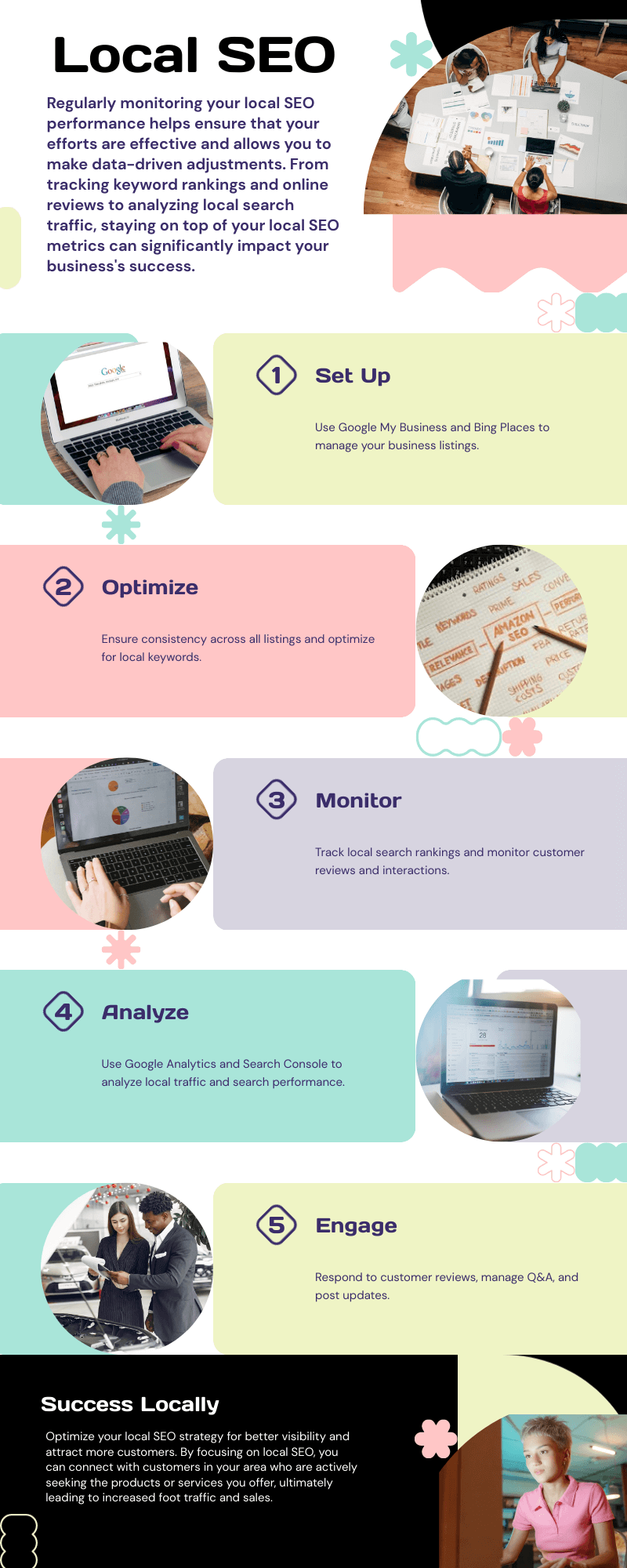Are you a local service-based business struggling to get found online? If so, you’re not alone. With so many businesses competing for visibility in local search results, it can be tough to stand out.
But don’t worry, I’ve got your back. Implementing effective local SEO strategies can help you dominate local search results and attract more customers in your area. In this post, I’ll share 10 proven local SEO strategies that can supercharge your online visibility and drive more qualified leads to your business.
1. Optimize Your Google My Business Listing
If you’re serious about local SEO, optimizing your Google My Business listing should be at the top of your priority list. Think of it as your virtual storefront – the first impression potential customers will have of your business when they search for you online.
Here’s what you need to do:
- Complete Your Listing: Fill out every section of your Google My Business listing with accurate and up-to-date information. This includes your business name, address, phone number, categories, hours of operation, and more.
- Add Rich Media: Photos and videos can make your listing more visually appealing and engaging. Upload high-quality images of your business, products, or services, as well as virtual tours or behind-the-scenes videos.
- Encourage Reviews: Positive reviews can significantly boost your local search rankings and improve your business’s credibility. Make it easy for customers to leave reviews by providing clear instructions and links to your Google My Business listing.
2. Build Local Citations and Listings
Local citations and listings are online mentions of your business name, address, and phone number (NAP) on various directories and websites. These citations act as digital breadcrumbs, helping search engines verify your business’s legitimacy and location.
Here’s how to build a strong citation profile:
- Find Relevant Directories: Start by listing your business on major directories like Yelp, YellowPages, and industry-specific directories. Then, expand to smaller, niche directories that are relevant to your business and location.
- Claim Your Listings: Once you’ve identified the directories, claim your listings and ensure that your NAP information is consistent across all platforms. Inconsistencies can confuse search engines and hurt your local SEO efforts.
- Monitor and Update: Regularly check your listings for accuracy and update any changes to your business information. This will help maintain a consistent online presence and avoid any penalties from search engines.
By building a solid foundation of local citations and listings, you’ll not only improve your local search visibility but also establish your business as a credible and authoritative presence in your community.
3. Focus on Localized Content
Creating content that resonates with your local audience is crucial for effective local SEO. By incorporating location-specific keywords and references, you can increase your chances of ranking higher in local search results and attracting more relevant traffic.
Here’s how to localize your content:
- Use Location-Based Keywords: Sprinkle your content with keywords that include your city, neighborhood, or region. For example, “plumbers in San Francisco” or “best Italian restaurant in Downtown LA.”
- Mention Local Landmarks and Events: Reference local landmarks, attractions, or upcoming events in your area. This adds a personal touch and helps establish your business as an integral part of the community.
- Write About Local News and Topics: Stay up-to-date on local news, trends, and happenings, and create content that addresses these topics from your business’s perspective.
- Encourage User-Generated Content: Invite customers to share their experiences, reviews, or photos related to your business and its local presence. This can help boost engagement and provide fresh, localized content.
By focusing on localized content, you’ll not only improve your local SEO but also build stronger connections with your target audience and establish your business as a trusted local authority.
4. Leverage Local Link Building
Link building is a crucial component of any Local SEO Service strategy, and local link building is no exception. By acquiring high-quality links from locally relevant and authoritative websites, you can boost your local search rankings and increase your online visibility.
Here are some effective local link building strategies:
- Sponsor Local Events: Sponsoring local events, charities, or community organizations can not only earn you valuable backlinks but also enhance your brand’s reputation within the local community.
- Partner with Complementary Businesses: Collaborate with other local businesses that offer complementary products or services. You can cross-promote each other’s offerings and exchange backlinks, creating a win-win situation for both parties.
- Guest Post on Local Blogs and Publications: Reach out to local bloggers, online magazines, or news outlets and offer to write guest posts or provide expert insights. This can help you earn high-quality backlinks while positioning your business as a local authority.
- Leverage Local Data and Statistics: Creating content that features local data, statistics, or industry-specific information can make your content more valuable and link-worthy for other local websites and online resources.
| Link Source | Impact on Local Rankings |
| Local Business Websites | High |
| Local Blogs/Publications | Moderate |
| Local Event Sponsorships | Moderate |
| Local Directory Listings | Low |
| Local Community Sites | Moderate |
As illustrated in the table above, links from locally relevant and authoritative websites, such as other local businesses and popular local blogs or publications, tend to have a higher impact on your local search rankings. By diversifying your local link building efforts, you can effectively improve your online visibility and establish a strong local presence.
5. Encourage and Respond to Online Reviews
In today’s digital age, online reviews are a powerful force shaping consumer behavior and purchasing decisions. Positive reviews can not only boost your local search rankings but also instill trust and credibility in potential customers.
Here’s how to leverage the power of online reviews:
- Make It Easy for Customers to Leave Reviews: Provide clear instructions and links to popular review platforms like Google, Yelp, and industry-specific sites. You can include these links in your email signature, on your website, or even on printed materials like receipts or business cards.
- Respond to Reviews (Positive and Negative): Engaging with reviews, both positive and negative, shows that you value customer feedback and care about their experiences. Respond promptly, professionally, and with a solution-oriented approach.
- Offer Incentives (Carefully): While offering incentives for reviews can be tricky, you can subtly encourage customers to leave honest feedback by providing exceptional service or small gestures of appreciation.
- Monitor and Manage Your Online Reputation: Use tools and services to track mentions of your business across various review platforms. This will allow you to stay on top of any negative feedback and address issues proactively.
By actively encouraging and responding to online reviews, you’ll not only improve your local search visibility but also build trust and credibility with potential customers, ultimately driving more business to your door.
6. Optimize for Mobile and Voice Search
With the rise of smartphones and virtual assistants like Siri and Alexa, optimizing for mobile and voice search has become essential for local businesses. People on the go often use their mobile devices or voice commands to search for nearby services and products.
Here’s how to ensure your business is ready for mobile and voice search:
- Make Your Website Mobile-Friendly: Ensure your website is responsive and optimized for smaller screens. This includes easy navigation, fast loading times, and a clean, user-friendly design.
- Use Conversational Language: Voice search queries tend to be longer and more conversational. Incorporate long-tail keywords and natural language into your content to better align with how people speak.
- Optimize for Featured Snippets: Featured snippets are the direct answers that appear at the top of search results, often triggered by voice searches. Structure your content in a way that increases your chances of being featured, such as using clear headings and concise paragraphs.
- Claim and Optimize Your Google Business Profile: Ensure your Google Business Profile (formerly Google My Business) is up-to-date and optimized with accurate information, images, and a compelling business description.
By optimizing for mobile and voice search, you’ll make it easier for potential customers to find and engage with your business, no matter where they are or how they search.
7. Implement Local Schema Markup
Schema markup is a structured data format that helps search engines better understand the content on your website. By implementing local schema markup, you can enhance your online presence and improve your visibility in local search results.
Here’s how to leverage local schema markup:
- Add Local Business Schema: The LocalBusiness schema type is designed specifically for local businesses. It allows you to provide detailed information about your business, such as address, hours of operation, and accepted payment methods.
- Use Service Schema for Service-Based Businesses: If you’re a service-based business, the Service schema type is particularly useful. It enables you to specify the types of services you offer, service areas, and even pricing information.
- Include Reviews and Ratings Markup: Positive reviews and ratings can significantly influence consumer behavior. By implementing the Review and Rating schema types, you can showcase your positive reviews directly in search results.
- Validate Your Markup: Use tools like Google’s Structured Data Testing Tool to ensure your schema markup is correctly implemented and free of errors.
By implementing local schema markup, you’ll not only improve your visibility in local search results but also provide search engines with more structured and contextual information about your business, leading to a better overall user experience.
8. Monitor and Manage Your Online Reputation
In today’s digital landscape, your business’s online reputation can significantly impact its success. Negative reviews, unflattering mentions, or outdated information can deter potential customers and harm your local search rankings.
Here’s how to effectively monitor and manage your online reputation:
- Set Up Google Alerts: Google Alerts is a free tool that allows you to monitor the web for mentions of your business name, brand, or specific keywords. Set up alerts to stay informed about what’s being said about your business online.
- Respond to Negative Reviews Promptly: When you encounter a negative review, respond promptly and professionally. Acknowledge the customer’s concerns, apologize if necessary, and offer a solution or resolution.
- Encourage Positive Reviews: Consistently deliver excellent service and products, and make it easy for satisfied customers to leave positive reviews on popular platforms like Google, Yelp, and industry-specific sites.
- Claim and Optimize Your Business Listings: Ensure your business listings on directories and review sites are accurate and up-to-date. Respond to reviews and engage with customers on these platforms to demonstrate your commitment to customer satisfaction.
- Consider Online Reputation Management Services: For businesses with a larger online presence or more complex reputation management needs, consider investing in professional online reputation management services.
By proactively monitoring and managing your online reputation, you’ll not only protect your brand’s image but also build trust and credibility with potential customers, ultimately driving more business your way.
9. Leverage Social Media for Local Outreach
Social media is a powerful tool for connecting with your local audience and building a strong community around your business. By leveraging social media platforms effectively, you can increase brand awareness, engage with potential customers, and drive more traffic to your website.
Here’s how to make the most of social media for local outreach:
- Choose the Right Platforms: Determine which social media platforms are most popular among your target audience and focus your efforts there. For local businesses, platforms like Facebook, Instagram, and Twitter are often good choices.
- Use Local Hashtags and Geo-Targeting: Incorporate location-specific hashtags (e.g., #SanFranciscoFoodie) and enable geo-targeting for your social media posts. This will help you reach and engage with users in your local area.
- Share Local Content and Promotions: Post about local events, news, and happenings that are relevant to your business and audience. Additionally, share special promotions or discounts exclusively for your local customers.
- Engage with the Local Community: Interact with other local businesses, influencers, and community members by liking, commenting, and sharing their content. This can help foster relationships and increase your visibility within the local community.
- Run Location-Based Social Media Ads: Social media advertising platforms like Facebook and Instagram allow you to target users based on their location. Use this feature to promote your business and offers to a hyper-local audience.
By leveraging social media for local outreach, you’ll not only increase your online presence but also build stronger connections with your local community, ultimately driving more foot traffic and business to your doorstep.
10. Track and Analyze Your Local SEO Performance
Measuring and analyzing the performance of your local SEO efforts is crucial for understanding what’s working and what needs improvement. By regularly tracking and reviewing your data, you can make informed decisions and adjust your strategies accordingly.
Here are some key metrics and tools to track your local SEO performance:
- Local Search Rankings: Use tools like BrightLocal or Whitespark to monitor your local search rankings for relevant keywords and track your progress over time.
- Google My Business Insights: Access valuable data on how customers find and interact with your Google My Business listing, including search queries, views, and engagement metrics.
- Website Analytics: Utilize website analytics tools like Google Analytics to track local traffic sources, user behavior, and conversions from your local SEO efforts.
- Review Monitoring: Keep an eye on your online reviews and ratings across various platforms, as they can significantly impact your local search visibility and conversion rates.
- Local Keyword Performance: Monitor the performance of your localized keywords and make adjustments to your content and on-page optimization strategies as needed.
By regularly tracking and analyzing these metrics, you’ll gain valuable insights into the effectiveness of your local SEO strategies. Use this data to identify areas for improvement, double down on what’s working, and continuously refine your approach for better results.

Conclusion
Local SEO is a powerful tool for service-based businesses looking to increase their online visibility and attract more customers in their local area. By implementing the strategies outlined in this post, you’ll be well on your way to dominating local search results and driving more qualified leads to your business.
Remember, local SEO is an ongoing process that requires consistent effort and optimization. Stay up-to-date with the latest trends and best practices, and continuously refine your strategies based on your performance data.
If you need help implementing these local SEO strategies or want to take your local online presence to the next level, consider working with a professional SEO agency or consultant. They can provide expert guidance and support tailored to your specific business needs and goals.




